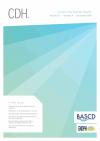Community Dental Health

- Cover Date:
- December 2018
- Print ISSN:
- 0265 539X
- Electronic ISSN:
- 2515-1746
- Vol:
- 35
- Issue:
- 4
A feasibility study to explore the governance processes required for linkage between dental epidemiological, and birth cohort, data in the U.K.
10.1922/CDH_4162Day03
Birth cohort initiatives, such as ‘Born in Bradford’, provide a unique opportunity to study the influence of socio-economic and environmental factors acting in pregnancy, birth and infancy on the development of dental caries in later life. This paper describes a feasibility study which established the processes required, and outcomes of, successful linkage of oral health data collected by the 2013 three-year-old national dental epidemiology survey with the Born in Bradford birth cohort database. The necessary processes included achieving research permissions and ethical approval; creation of a data sharing agreement; ensuring data security and encrypted data transfer. With regard to the outcomes, a robust a priori statistical plan was developed. 152 three-year-old children were examined for the 2013 dental epidemiology survey in Bradford, and of those, 69 parents consented to data linkage believing that their child was part of the Born in Bradford cohort. However, only 36 of these 69 children were participating in the cohort. Of these, six children had obvious dentinal caries experience (dmft >0). There was insufficient power with such small numbers, to examine the association between birthweight and dental caries at the age of three-years-old. Key learning points from this feasibility study have informed the design of a larger study to link the 2014/5 five-year-old dental epidemiology surveys with the Born in Bradford cohort. This paper reveals the important methodological considerations for future data linkages between routine health data and research data.
Keywords: Dental caries, Birth cohort, Dental data linkage, Lifecourse epidemiology, Feasibility study
- Article Price
- £15.00
- Institution Article Price
- £
- Page Start
- 201
- Page End
- 203
- Authors
- Peter F. Day, Emily Petherick, Jenny Godson, Jenny Owen, Gail Douglas
Articles from this issue
- Title
- Pg. Start
- Pg. End
- Understanding oral health care needs and oral health-related quality of life in vulnerable adults in Plymouth
- 197
- 200
- A feasibility study to explore the governance processes required for linkage between dental epidemiological, and birth cohort, data in the U.K.
- 201
- 203
- Results of a two year dental health education program to reduce dental caries in young Aboriginal children in New South Wales, Australia
- 211
- 216
- A multi-variable analysis of four factors affecting caries levels among five-year-old children; deprivation, ethnicity, exposure to fluoridated water and geographic region
- 217
- 222
- The impact of age and deprivation on NHS payment claims for domiciliary dental care in England
- 223
- 227
- Why might patients in the UK consult a general medical practitioner when experiencing dental problems? A literature review of patients’ perspectives
- 235
- 240
- Decision tree analysis for factors associated with dental caries in school-aged children in Japan
- 247
- 251
- Dentist’s views on incorporating oral health collaborative practice into primary medical care in Ireland
- 252
- 256
